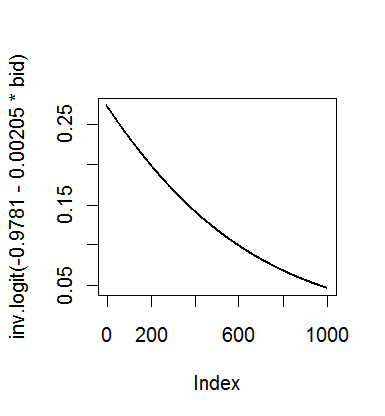This generalized linear model supposes the outcome associated with an independent value of $x$ has a binomial distribution whose log odds ("logit") vary linearly with $x$. The output provides the coefficients of that linear relation; namely, the intercept is estimated as -0.9781 and the slope ("our_bid") as -0.002050. The You can see them in the Estimate column:
Estimate Std. Error z value Pr(>|z|)
(Intercept) -9.781e-01 2.836e-02 -34.49 <2e-16 ***
our_bid -2.050e-03 7.576e-05 -27.07 <2e-16 ***
The probability, which you wish to plot, is related to the log odds by
$$\text{probability} = \frac{1}{1 + \exp(-\text{log odds})}.$$
R calls this the "inverse logit" function, inv.logit.
Putting these together gives the equation
$$\text{probability} = \frac{1}{1 + \exp\left(-[-0.9781 - 0.00205 x]\right)}.$$
An R command to plot it would be
plot(inv.logit(-0.9781 - 0.00205*(0:1000)))

In general, you should extract these coefficients with the coefficients command rather than transcribing them (as I did here, because I do not have access to your data).
